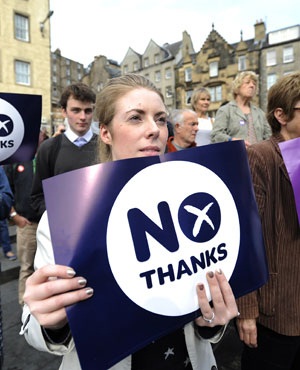The Church of Scotland’s moderator John Chalmers called for Scots to “live in harmony with one another” whatever the result and hailed the run-up to the independence vote as “a wonderful democratic concerto”.
“All of those who will vote ‘Yes’ and all of those who will vote ‘No’ need to remember that we belong together in the same Scotland,” he said in a sermon at St Mary’s Episcopal Cathedral in the capital Edinburgh.
“We cannot afford to lose the momentum and interest in civic life which this campaign has generated,” said Chalmers, whose Church represents the largest religious group in Scotland.
The pro-union camp had been far ahead in the polls for many months, but the difference has narrowed in recent weeks and a raft of surveys over the weekend indicated that the vote could go either way.
An Opinium survey for Sunday’s Observer newspaper put “No” at 47.7% and “Yes” at 42.3%, with 10% not voting or not sure if they would.
A poll by Panelbase for the Sunday Times with the undecideds taken out gave “No” the slimmest of margins with 50.6% to 49.4%.
An ICM online poll for the Sunday Telegraph meanwhile gave the nationalists 49%, ahead of the pro-UK camp at 42% with 9% undecided, although pollsters warned the sample size was too small.
“The polls show that the referendum is on a knife-edge. There is everything to play for,” said Blair Jenkins, chief executive of the “Yes Scotland” campaign.
‘Down to the wire’
Both sides are scrambling to win over the undecided voters who could hold the balance.
“We’re not aiming to win by one vote, we’re aiming to achieve a substantial majority,” Scotland’s pro-independence First Minister Alex Salmond told BBC television.
“This is a once in a generation opportunity,” he said.
His chief opponent Alistair Darling, a former British finance minister, met with financial industry workers in Edinburgh amid concern about the economic impact if Scotland votes “Yes”.
“This is going to go down to the wire but I think we will win because I don’t think Scotland is going to get bullied into accepting something that it doesn’t want,” he said.
Their comments came ahead of a pro-independence concert in Edinburgh on Sunday dubbed “A Night for Scotland” that will be headlined by the Scottish bands Franz Ferdinand, Mogwai and Frightened Rabbit.
Benefits of both sides
A key battleground for the two camps has been Glasgow, Scotland’s biggest city.
At St Andrew’s Catholic Cathedral, 67-year-old volunteer Tony Maddon said he was opposed to independence.
“Myself and my wife are both firm ‘No’ voters. We’ve already voted by postal vote. We’re British!” he said.
“I think we’re better off together. Small things don’t normally go very far in the world,” the pensioner added.
But at Celtic Park football stadium during a match on Saturday between Glasgow Celtic and Aberdeen, Danny McGee said he had made up his mind for separation.
“Without a shadow of a doubt the working class is for this. We feel we’re up against corporate UK,” the 28-year-old Celtic supporter said at half-time.
At the Church of Scotland’s Glasgow Cathedral, Heather Burleigh, said she had enjoyed the debate.
“I don’t think it has been divisive. It has made people think and created a lot of discussion,” the 53-year-old university administrator said.
“I think it is hard if you are kind of in the middle. I think I know which way I’m going to vote – ‘No’ – but I can see the benefits of both sides.”



